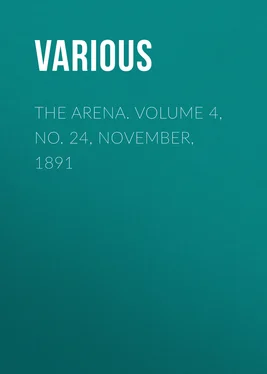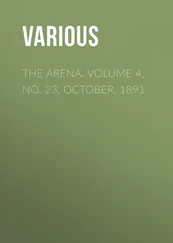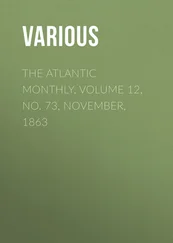Various - The Arena. Volume 4, No. 24, November, 1891
Здесь есть возможность читать онлайн «Various - The Arena. Volume 4, No. 24, November, 1891» — ознакомительный отрывок электронной книги совершенно бесплатно, а после прочтения отрывка купить полную версию. В некоторых случаях можно слушать аудио, скачать через торрент в формате fb2 и присутствует краткое содержание. Жанр: foreign_antique, periodic, foreign_edu, на английском языке. Описание произведения, (предисловие) а так же отзывы посетителей доступны на портале библиотеки ЛибКат.
- Название:The Arena. Volume 4, No. 24, November, 1891
- Автор:
- Жанр:
- Год:неизвестен
- ISBN:нет данных
- Рейтинг книги:4 / 5. Голосов: 1
-
Избранное:Добавить в избранное
- Отзывы:
-
Ваша оценка:
- 80
- 1
- 2
- 3
- 4
- 5
The Arena. Volume 4, No. 24, November, 1891: краткое содержание, описание и аннотация
Предлагаем к чтению аннотацию, описание, краткое содержание или предисловие (зависит от того, что написал сам автор книги «The Arena. Volume 4, No. 24, November, 1891»). Если вы не нашли необходимую информацию о книге — напишите в комментариях, мы постараемся отыскать её.
The Arena. Volume 4, No. 24, November, 1891 — читать онлайн ознакомительный отрывок
Ниже представлен текст книги, разбитый по страницам. Система сохранения места последней прочитанной страницы, позволяет с удобством читать онлайн бесплатно книгу «The Arena. Volume 4, No. 24, November, 1891», без необходимости каждый раз заново искать на чём Вы остановились. Поставьте закладку, и сможете в любой момент перейти на страницу, на которой закончили чтение.
Интервал:
Закладка:
In the first place, the question of free trade or protection is in no sense a moral one. Free traders are prone to forget that their great prophet, Adam Smith, drew this distinction very plainly at the outset. He wrote two important works. One of them all the world has read. It is called “The Wealth of Nations,” deals with the selfish interests of mankind, and embodies the author’s political economy. The other is an equally elaborate work entitled “The Moral Sentiments.” It is the complement of “The Wealth of Nations,” which is devoted to the selfish side of human nature and the world at large has found no trouble in forgetting it. Adam Smith himself was under no confusion of mind as to his subject when he wrote about political economy. He knew that he was dealing with questions of a selfish character, of an enlightened selfishness, no doubt, but none the less questions of self-interest. He never for a moment thought of putting his political economy on a plane of pure morality.
When the great political movement toward free trade began in England, it was largely a movement of the middle classes and of the industrial interests of Great Britain. The great middle class of England, which furnishes the backbone and sinew of the nation, is essentially a moral class, and in appealing to it the political leader is always tempted to put forward the moral aspect of his theme, even if he has to twist his argument and his facts to find one. The manufacturers of England believed that free trade would be profitable, but it soothed them to be assured that the system was also highly moral. It is to the Manchester School, therefore, that we owe the attempt to give to the entire free trade system a moral coloring for which the narrower question of the repeal of the corn laws afforded an opportunity. Our own free traders for the most part are devout followers of the Manchester School, and take all their teachings and practices with little discrimination. They are essentially imitative. The anti-corn law agitators pointed their arguments by exhibiting loaves of bread of different sizes, and so our free traders, during a campaign, have gone about in carts and held up pairs of trousers, a more humorous if less intelligent form of object lesson. They attempt, too, in like fashion, to give the weight of morality to their doctrines. Unfortunately for them, inasmuch as everyone likes to be moral at some one’s else expense, their position is untenable. Adam Smith’s distinction was a broad and sound one; and deeply important as political economy and questions of tariff are, they are in no sense matters of morals. They are purely questions of self-interest, of profit and loss, and can be decided properly on these grounds alone.
In the second place, the assumption made tacitly, at least, if not avowedly, that political economy is an exact science is wholly misleading. Political economy covers a wide range of subjects of which the tariff is only one; but in none of its branches is it an exact science. Modern investigation has, no doubt, revealed certain economic laws which we may fairly say operate with reasonable certainty, but this is a very different proposition from that which would make the conclusions of economists in all directions as absolute as those of mathematicians. Political economy, in fact, does not differ greatly in this respect from history, because both deal with subjects where the conditions and sympathies of men and women play a large part, and where human passions are deeply engaged. In fields like these, where the personal equation of humanity plays a controlling part, it is absurd to attempt to argue as if we were dealing with a mathematical formula. There may be a philosophy of political economy as there is of history; there may be scientific methods of dealing with it and certain economic laws, subject to many exceptions, which we may consider to be established, but nevertheless it is as far from being an exact science as one can conceive. The exact science notion is the misconception of cloistered learning which can build impregnable systems where there are none to attack them, but which has no idea of the practical difficulties of an unsympathetic world where the precious system must meet every possible objection and not merely those devised by its framers. In discussing a question of political economy, therefore, it is well to bear in mind that we are handling a subject where new facts are always entering in to modify old conclusions, and where there are many conditions, the effect of which it is impossible to calculate.
In the third place, the ardent tariff reformer at the present moment always discourses upon his subject as if he had some perfectly new truth to lay before the world from which it would be as impossible to differ, unless one was illiterate or corrupt, as from the conclusion of Galileo in regard to the movement of the earth. In one of our recent political campaigns I quoted an argument of Hamilton’s in favor of protection from his famous Report of Manufactures. Thereupon one of my opponents in a public speech, referring to this quotation, said it would be as sensible to adopt Hamilton’s views on the tariff as to go back to stage coaches simply because those vehicles were the means of conveyance in Hamilton’s time. I could not help wondering what my learned opponent would have thought if I had retorted that, by parity of reasoning, we ought to reject the “Wealth of Nations” because Adam Smith flourished a little earlier than Hamilton, and stage coaches were used in his day also. The simple truth is that there is nothing very new to-day in the question of free trade or protection. The subject is one which has been under consideration for some time. It has received great developments in the last hundred years, and is still so far from the last word that it is safest not to be too dogmatic about it.
In this matter of the tariff, then, we have before us a question which is not new, which is not moral, but which deals simply with matters of self-interest according to the dictates of an enlightened selfishness. What is the condition of the question of free trade to-day in its practical aspect? Fifty years ago, roughly speaking, the movement for it in England became successful, and the English people abandoned a protective tariff which they had maintained for some centuries and adopted the free trade tariff which they have to-day. The latter system has had a thorough trial in England under the most favorable circumstances. If there is any country in the world which, by its situation, its history and its condition, is adapted for free trade, England is that country. If free trade, therefore, is the certain and enormous benefit which its advocates assert, and if it is the only true system for nations to adopt, its history in England ought to prove the truth of these propositions. How near has free trade come to performing all that its original promoters claimed in its behalf? How brilliant has been its success in practise? One thing at least is certain: it has not been such an overwhelming and glittering success as to convince any other civilized nation of its merits. England stands alone to-day, as she has stood for the last fifty years, the one free trade nation in the world. Possibly England of all the nations may be right and everybody else may be wrong, but there is, at least, a division of opinion so respectable that we may assume, with all due reverence for our free trade friends, that there are two sides to this question as to many others.
Let us look for a moment at some of the early promises. Free trade, according to its originators, was to usher in an era of peace and good-will. It was, in its extension, to put an end to wars. It has certainly not brought peace to England, which has had a petty war of some sort on her hands almost every year since the free trade gospel was preached. I do not mean to say that this is in the least due to free trade, but it is quite obvious that free trade did not stop fighting. The prosperity of England has, of course, been undeniably great, and it has been especially great among the vast industrial and manufacturing interests which supported the free trade policy. Possibly they have thriven better under this system than they would have done under the old one, but this must remain mere speculation, and as we know that some protected countries have prospered as much if not more than England, the prosperity argument has little weight. There are, however, other fields where we need not rely on conjecture. Has free trade been an unquestionable benefit not merely to the industrial but to all classes in England? It certainly has not put an end to strikes, for strikes have never been more frequent anywhere than they have been in Great Britain of late years. It does not seem to have perceptibly diminished poverty, if we may judge from such recent books as “The Bitter Cry of Outcast London,” and “Through Darkest England.” The state of Ireland has not been indicative of a healing and life-giving prosperity. In a word the great problems of labor, of poverty, and of over-population seem as severe in free trade England as in protective countries. Free trade again does not seem to have prevented the rise of trusts and syndicates, nor to have stopped the accumulation of vast wealth in a few hands. In other words, there is no evidence that free trade has had any effect on the most serious questions of the day, which touch the welfare of the great masses of the people. All that can be said is that the manufacturing and industrial interests of Great Britain seem to have thriven under it. For a system which arrogates to itself absolute truth, this is a meagre showing.
Читать дальшеИнтервал:
Закладка:
Похожие книги на «The Arena. Volume 4, No. 24, November, 1891»
Представляем Вашему вниманию похожие книги на «The Arena. Volume 4, No. 24, November, 1891» списком для выбора. Мы отобрали схожую по названию и смыслу литературу в надежде предоставить читателям больше вариантов отыскать новые, интересные, ещё непрочитанные произведения.
Обсуждение, отзывы о книге «The Arena. Volume 4, No. 24, November, 1891» и просто собственные мнения читателей. Оставьте ваши комментарии, напишите, что Вы думаете о произведении, его смысле или главных героях. Укажите что конкретно понравилось, а что нет, и почему Вы так считаете.












